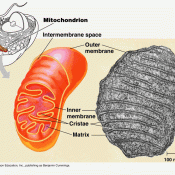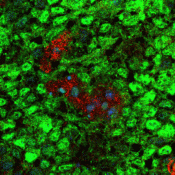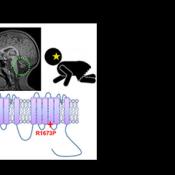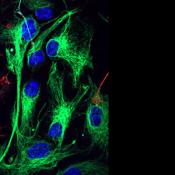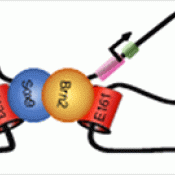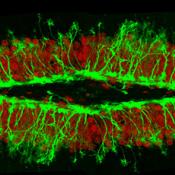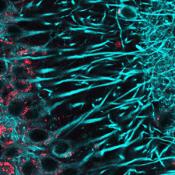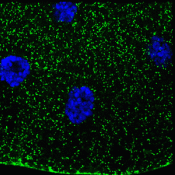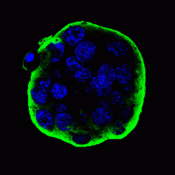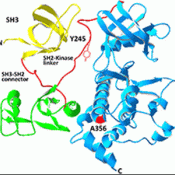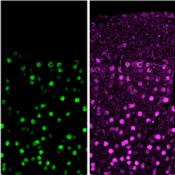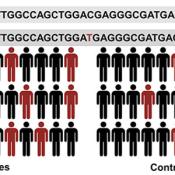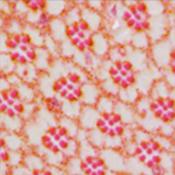Research Breakthroughs
NRI researchers identify the gene largely accounting for a complex neurological condition
2/2/18NRI researchers identify OTUD7A as the gene responsible for 15q13.3 microdeletion syndrome, a complex neurological condition.
A new strategy to fight Huntington's disease
1/15/18Researchers in the laboratory of Dr. Juan Botas, investigator at the Jan and Dan Duncan Neurological Research Institute and professor at Baylor College of Medicine, are among the team of NIH scientists and collaborators who have uncovered a potential new strategy to treat Huntington's disease.
Mitochondrial metabolite linked to regulation of neurotransmission
1/2/18A study from the Dr. Hugo's Bellen lab shows how alpha-ketoglutarate, produced by mitochondria, the energy generators of the cell, plays an unexpected role in the regulation of neurotransmission linking mitochondrial dysfunction and neuronal disorders.
NRI researchers identify a promising drug target for childhood brain tumors
12/7/17In this study, Dr. Tiemo's team have found a novel way to reduce a particular type of medulloblastoma, the most common malignant brain tumors in children. This promising discovery could act as adjunct therapy to increase remission rates and cancer-free survival among the patients of sonic hegdehig-type medulloblastoma patients.
How having too much or too little of CHRNA7 can lead to neuropsychiatric disorders
12/5/17A recent paper from Dr. Christian Schaaf's lab finds how too much or too little CHRNA7 can lead to neuropsychiatric disorders.
Defects in the neuronal ‘waste disposal system’ linked to Parkinson’s disease
11/17/17Dr. Joshua Shulman's team finds that a group of genes involved in childhood lysosomal storage disorders are also affected in Parkinsons' patients.
Studies on a young ataxia patient could guide treatment for a novel condition
10/5/17Physicians determine a unique treatment plan for an ataxia patient carrying a novel, toxic, "gain-of function" mutation in a calcium channel gene. This exciting discovery could potentially become a standard paradigm for treating such patients in the future.
Breakdown of brain cells’ metabolic collaboration linked to Alzheimer’s disease
9/28/17Researchers have discovered that impairing a critical partnership between brain cells can lead to neurodegeneration.
Novel regulatory DNA loops found in gliomas: a promising target for future therapies
9/19/17Dr. Benjamin Deneen and colleagues have identified novel regulatory DNA loop structures that could be promising targets for gliomas.
New study reveals potential drug targets for MECP2 duplication and Rett syndromes
9/5/17An exciting study published in Science Translational Medicine from the laboratory of Dr. Huda Zoghbi, director of the Jan and Dan Duncan Neurological Institute (NRI) at Texas Children’s Hospital, and professor at Baylor College of Medicine, describes the discovery of new ‘druggable’ modulators of methyl-CpG-binding protein 2 (MeCP2), a key neuronal protein.
CRISPRCloud: A new web tool developed by NRI researchers to mine and analyze CRISPR data
9/4/17NRI scientists have developed a new bioinformatics tool to easily analyze and collate CRISPR sequencing data.
Lunatic Fringe plays a key role in renewing neurons
8/7/17Researchers have developed a novel Lunatic fringe (Lfng) reporter and lineage tracing mouse model that selectively labels primary NSCs. Using these mice, researchers have found a novel mechanism by which descendants of NSCs are able to send feedback signals to alter the division and the fate of the mother cell.
A potential therapeutic target for juvenile Batten disease
8/3/17Researchers in the laboratory of Dr. Marco Sardiello have identified a pharmacologically actionable target for juvenile Batten disease, a rare but fatal pediatric neurodegenerative disorder. The study was published in Nature Communications. Juvenile Batten disease is the most common form of neurodegeneration in young children.
Patient-inspired research links sugar metabolism to a rare genetic disorder
6/29/17A team of scientists from many institutions, including the NRI, have recently published a paper in the journal PLoS Genetics that links alterations in sugar metabolism to Zellweger syndrome, a rare life-threatening genetic disorder. Zellweger syndrome/Peroxisomal biogenesis disorder results from defects in genes that synthesize peroxisomes, essential components of the cell that help to form and breakdown certain lipids.
MARRVEL to the rescue: a novel web tool to expedite gene discovery
5/11/17Researchers at the NRI have created a very useful open-access, user-friendly web resource, MARRVEL (Model Organism Aggregated Resource for Rare Variant ExpLoration) that will help biomedical researchers speed up their pace of scientific discovery.
Mutations in an early embryonic development gene may cause female infertility
3/27/17A team of researchers headed by Dr. Ignatia Van den Veyver have shown that mutations in an early embryonic development gene may provide some clue to unexplained female infertility and recurrent pregnancy loss. The study was published in Scientific Reports, a member of the Nature family of journals.
Mutations in ABL1, a known leukemia gene, cause a new developmental disorder
3/20/17Researchers at the NRI have identified a novel role for ABL1, a known tumorigenic gene, in a new developmental disorder. The study was published in the journal, Nature Genetics journal and was led by Drs. Christian Schaaf, Yaping Yang and Xia Wang, faculty at the Baylor College of Medicine.
Loss of Ataxin1-Capicua complex causes a novel neurodevelopmental disorder
3/13/17A collaborative study spearheaded by Dr. Huda Zoghbi shows that loss of Ataxin1-Capicua (ATXN1-CIC) complex causes a previously unidentified neurodevelopmental disorder in mice and humans. This discovery, published in Nature Genetics, perfectly illustrates how meticulous studies in animal models can lead to serendipitous discovery of new syndromes, which helps patients and their families to receive accurate diagnosis and more importantly, gives them hope for possible future treatments.
Fruit flies can help solve complex genetic diseases
2/22/17In a review published in the journal Disease Models & Mechanisms, Drs. Joshua Shulman and Michael Wangler argue that fruit flies are one of the best biological tools to decipher complex genetic disorders. The authors urge for closer dialogue and collaborations between human geneticists, who typically lead GWAS studies, and basic fly biologists who are expert in the dissection of genetic mechanisms.
Five new candidate genes for Parkinson’s disease identified
2/20/17A large collaborative study led by Dr. Joshua Shulman and Dr. Peter Heutink has revealed five strong candidate genes for Parkinson’s disease. In this one-of-a-kind study sponsored by the International Parkinson’s Disease Genomics Consortium (IPDGC), researchers performed whole-exome sequencing and functional analysis of 1148 unrelated Parkinson’s disease cases, the largest such cohort examined to date, and compared their results with 503 control participants of European ancestry.


